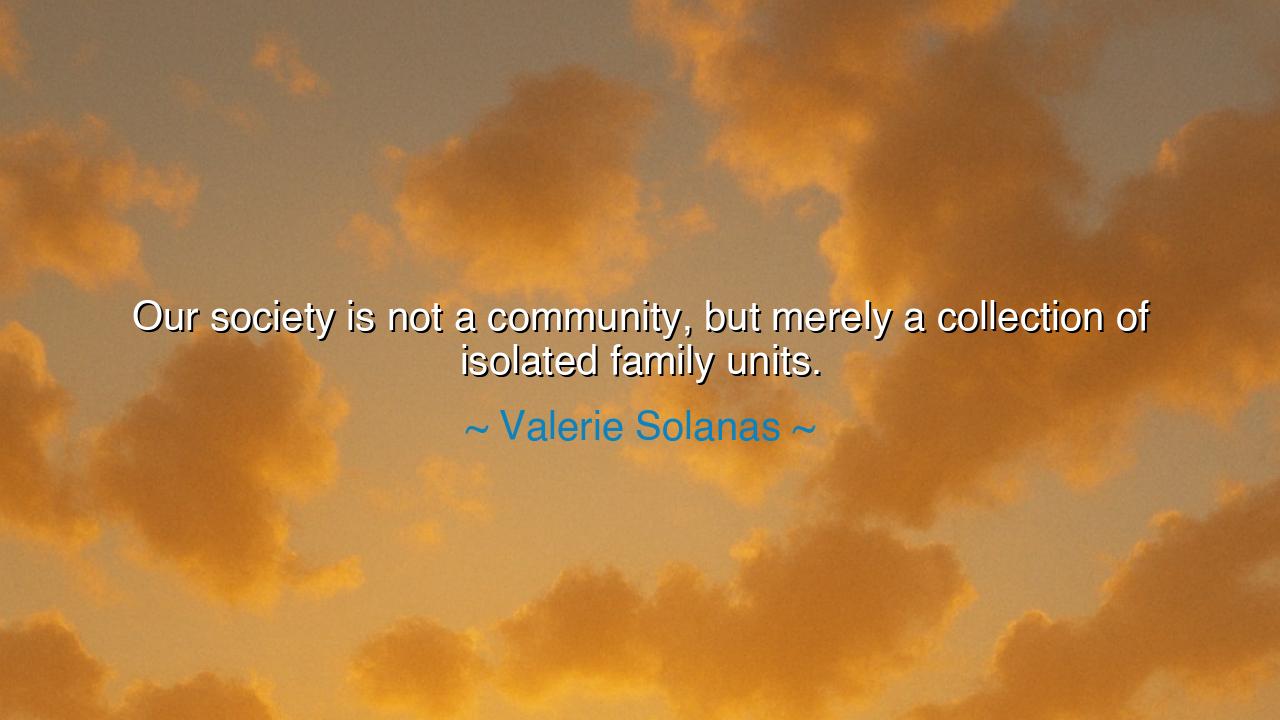
Our society is not a community, but merely a collection of






Hear the fierce cry of Valerie Solanas, who declared: “Our society is not a community, but merely a collection of isolated family units.” These words strike at the heart of human existence, for they reveal the loneliness hidden beneath the surface of modern life. To be a community is to be bound together, to share burdens, to rejoice in common joys, and to build a life larger than oneself. But when people withdraw into walls of separation, clinging only to their own kin, the great fabric of society frays, and we are left with fragments—families enclosed like islands, drifting apart in an endless sea.
The ancients knew well the difference between community and isolation. In the Greek polis, life was lived together—markets were shared, debates filled the air, and festivals bound people as one. In the villages of old, neighbors tilled fields side by side, raised barns together, and cared for one another’s children. There, the family was not cut off, but woven into the greater whole. Solanas’ words lament that in the modern age, this weaving has come undone, leaving families walled in by privacy, but deprived of the richness of shared life.
Consider the story of industrial cities in the nineteenth century. As families left villages and ancestral lands to work in factories, they often found themselves surrounded by strangers. Each household labored for survival, cut off from kin, tradition, and the communal rhythms that once gave life meaning. Though crowded into tenements, they were lonely, for there was no true community—only a mass of families surviving side by side, yet apart. From this isolation grew not harmony, but despair, unrest, and division.
But there are brighter examples, too, that remind us of what Solanas longed for. After the devastation of the Second World War, many nations sought to rebuild not only homes but also shared life. In places where citizens joined to form cooperatives, mutual aid societies, and neighborhood councils, the spirit of community was rekindled. These efforts showed that families, though important, cannot carry the weight of society alone. Only when families join into networks of solidarity does the human spirit flourish.
The meaning of Solanas’ words is both warning and call: a society of isolated families cannot endure. Each family may survive for a time in its private shell, but without shared responsibility, without common life, there is no true society—only fragments that sooner or later drift into conflict. Civilization is not built by solitude, but by unity. The strength of a people lies not only in bonds of blood, but in the ties that connect neighbor to neighbor, stranger to stranger, soul to soul.
The lesson for us is plain. We must not let our homes become fortresses, shutting out the wider world. Instead, we must open our doors and our hearts, building connections beyond the walls of kinship. Join with others in acts of service. Share meals, labor, and stories. Let children see that their family is part of something greater, a living body of community. In doing so, we restore what modern isolation has eroded—the ancient truth that to be human is to belong to one another.
Therefore, O listener, take Solanas’ cry into your heart: “Our society is not a community, but merely a collection of isolated family units.” Let it awaken you to the poverty of isolation and the richness of community. Do not accept a life of walls and separations, but strive to weave your family into the greater tapestry of humanity. For when families stand alone, society fractures; but when families join as one, society becomes whole, enduring, and strong.
And so, let this wisdom endure: family is the seed, but community is the soil. Without the soil, the seed cannot grow. Nurture both, and society will blossom into its true destiny—not as a collection of fragments, but as a living, breathing community.






AAdministratorAdministrator
Welcome, honored guests. Please leave a comment, we will respond soon